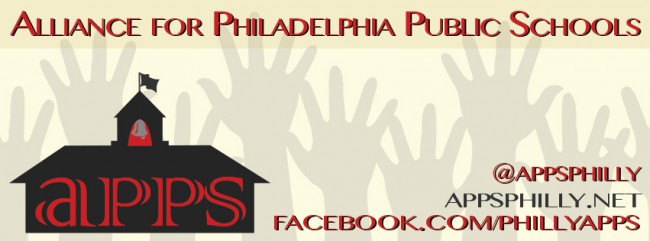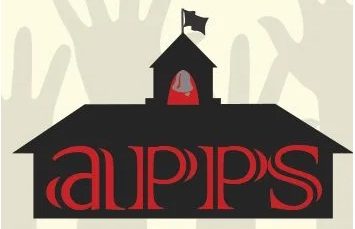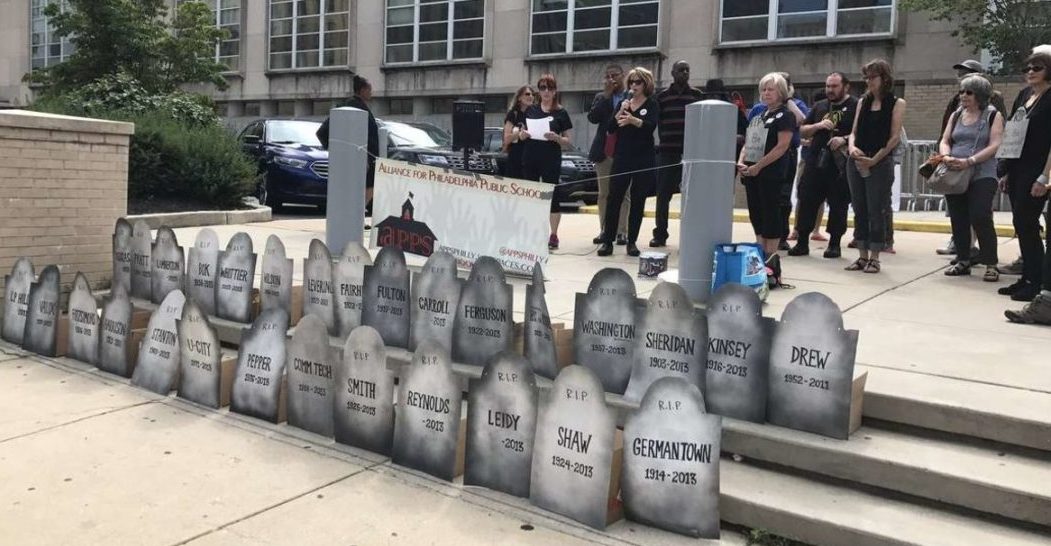
by Karel Kilimnik
April 13, 2018
End of the Line
As the lame-duck SRC limps towards the finish line, millions of taxpayer dollars continue to flow into the pockets of private vendors. Case in point: Carnegie Learning contract to provide “ professional development services to approximately 1500 K-8 Algebra I teachers in support of the District’s annual summer mathematics initiative” received another $3 million at the March 15 SRC meeting (B-3). Carnegie has pocketed $15 million from District contracts over the past two years. Carnegie has little investment in public schools other than increasing their own corporate footprint. Why can’t those funds be used to hire experienced Math teachers and coaches who work for the district and know the students, the schools and the curriculum?
Vacant school buildings are being sold for pennies on the dollar and converted to marketplace housing. Despite community efforts, Ada Lewis Middle School, once the largest middle school in the city, was closed almost twenty years ago; the District allowed it to become a neighborhood eyesore. Developers eye school buildings as potential profitable housing projects. At the March 15 SRC meeting, it was revealed (Resolution A-10) that the developer added a contingency clause to the sale of this property for rezoning to include “residential and mixed-use development”.
SRC to Vote on Charter Do-Overs
APPS continues its fight to stop the district’s approval of new charters which would only add to the district’s financial burden. APPS members testified at all public hearings for new charter applications, again reminding the SRC that the district cannot afford to commit to enter into contracts which would last 10-15 years (few charters are revoked, no matter how poor their performance). In a victory for neighborhood schools, the SRC approved only one of the seven applicants. Commissioner Green reprised his role as charter cheerleader when he encouraged those who had been denied to reapply. Thus far, Franklin Towne Middle Charter School has done just that. APPS members have analyzed the new application and found it to contain few substantial changes. The SRC has no public hearings scheduled for consideration of FTC’s new application, but that will not stop them from voting on the matter at its April 26 meeting. What Franklin Towne has yet to explain is why they need a middle school for 450 additional students when FTC elementary has students in grades K-8. This application is a back-door effort to expand its middle school enrollment.
Diane Payne’s extensive report on Franklin Towne raises crucial issues about the company’s two existing schools, including the schools’ mishandling of a whistle-blower suit, circular real estate dealings, and the CEO’s $226, 000 annual salary for overseeing (his duties are unclear) two schools.
The answer can be found in the circular real estate dealings described in former City Controller Alan Butkovitz’s 2010 investigation into 13 Charter Schools. Butkovitz specifically cites Franklin Town CEO Joseph Venditti for leasing the school’s property to his for-profit entity, then subleasing it back to the school.
The PA Charter School Law allows any denied charter applicants to submit a revised application; there is no deadline, and the charter applicants can resubmit with the next round in November. We expect that there will be other resubmissions, again, with no opportunity for the public to be heard about them. The only notice we have is the appearance of the matter on the Resolution Summary less than two weeks before the meeting. This is not transparency, and it is not an adequate public hearing process, considering the millions new charters will divert from neighborhood schools.
The SRC regularly fails to post resolutions in a timely manner. Per the 2016 Settlement Agreement of the APPS Sunshine Lawsuit, SRC resolutions must be posted at least two weeks before the meeting. This has been violated numerous times. The public’s right to know how money is being spent appears a moot point to the SRC.
Speaking Out
Several speakers at the March 15 SRC meeting addressed the lack of Bi-Lingual Counselors (BCAs). A Nepalese student testified about the crucial role her BCA played in helping her adjust to her new life in Philadelphia. The District, for some reason, is cutting BCA hours despite the growing need for them. If not for the consistent testimony of APPS member Cheri Micheau about the urgent needs of Students With Limited or Interrupted Formal Schooling (SLIFES), most people would be unaware of their needs and the District’s failure to fully support them. Many high school immigrant students have attended only a few years of school or less in their countries of origin and have not acquired even the basics of mathematics or literacy in their native languages. Cheri offers tangible goals for helping these students in their academic work, such as creating a “flexible and non-traditional high school schedule that provides sufficient time in larger blocks for the kind of intensive practice required to move the students forward.” These commonsense and research-based ideas would support student learning and graduation rates.
SRC Commissioners Jump Ship
Between the February and March SRC meetings, Commissioner Farah Jimenez submitted her resignation from the SRC, without providing any reason, to Governor Wolf. In early March, an Inquirer story revealed that Commissioner Green had filed official papers to run for US Congress. APPS sent a letter citing Green’s violation of the PA Public School Code:
“Section(6) Section 696 (b)(6) of the Public School Code of 1949, as amended, states:
No commission member may, while in the service of the School Reform Commission, seek or hold a position as any other public official within this Commonwealth or as an officer of a political party.”
Despite Governor Wolf’s agreement that Green was violating the law, he declined to enforce the law and remove Green from the SRC.Wolf’s justification was that he did not want to spend state funds fighting a lawsuit that Green might file.
Finally, Commissioners Chris Mc Ginley and Joyce Wilkerson resigned in anticipation of being appointed to the new school board. APPS issued a statement on their departure and implications for the remaining three months of the SRC. This revolving door swings fast and furious on District stakeholders, who are not even given the courtesy of knowing of these changes before they open their morning newspapers.
Money Matters
How much public money did the SRC spend at its March 15 meeting? In just 39 resolutions, and in only three votes, they spent $180,164,794. We hope that a return to local control will mean that the new board will not spend money in this cavalier a manner.
APPS members continue to be an important presence at every SRC meeting, presenting testimony that raises questions and challenges decisions being made by the remaining commissioners. The SRC may be lame ducks but their decisions will have lasting effects.
We will not stand by silently as our childrens’ education is compromised by those motivated by greed or political aspirations.
Three APPS members spoke on charter schools, blended learning, and the legal decision rendered by the District General Counsel’s Office that supported commissioner Green’s potential run for congressional office.
The March 22 Action Meeting saw the SRC pass just three resolutions, all unanimously. SRC-1 concerned the budget Authorization of the Issuance of General Obligation Bonds, Series A of 2018 with no accompanying text. SRC -2, Adoption of Lump Sum Statement, included a summary of the lump sum figures. Finally, the long-awaited passage of SRC-3, Policy 406, addressed the process by which the District will handle mid-term charter amendments. The policy was introduced in November 2017; the SRC postponed voting on it to address concerns of charter operators and lobbyists.

